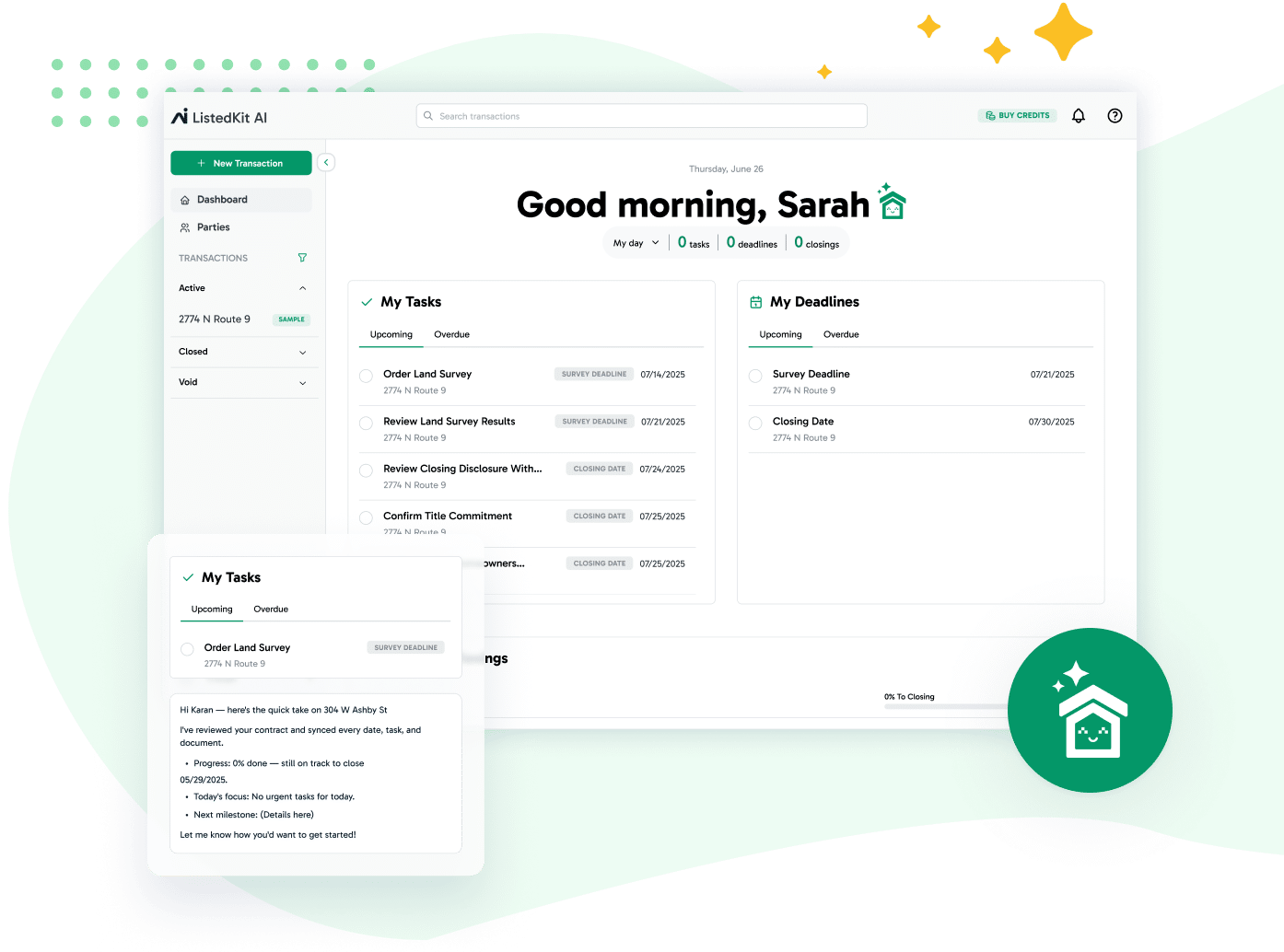Expanding a transaction coordinator (TC) business definitely comes with its distinct hurdles. Transitioning from managing just a handful of transactions to overseeing a substantial volume often reveals inefficiencies in manual workflows and highlights communication gaps that were previously unnoticed.
In this blog, we’ll walk into how you can take advantage of the market’s current situation, make use of standard operating procedures (SOPs), apply progressive automation, and use software to optimize operations and effectively scale your TC business.
Challenges of Scaling from 10 to 50 Transactions a Month
One frequent issue is depending heavily on manual processes. Coordinating transactions can be overwhelming, with tasks such as sending out numerous emails, following up with real estate agents, or chasing after signatures.
These activities might seem manageable when dealing with fewer transactions but become increasingly cumbersome as your workload grows.
Miscommunications and delays tend to occur more often, adding stress and diminishing the quality of service you provide.
Moreover, handling higher volume transactions increases the risk of overlooking important details. Without well-defined systems in place, tasks may slip through the cracks, leading to missed deadlines or incomplete paperwork. This could negatively affect relationships with real estate agents and potential buyers alike. Therefore, it’s very important to identify these pain points early on and take proactive measures to address them.
By focusing on these key areas, manual processes, communication breakdowns, and inconsistent workflows, you can create more streamlined operations that support scalability even during challenging times.

Discover Personalized Growth Tips for Your Business
How to Scale Your Real Estate Business
The ebb and flow in the real estate sector, especially in bustling hubs like San Francisco, can sometimes mean a dip in home sales. Yet, this slower rhythm actually offers a golden opportunity to fine-tune your operations. During these quieter times, you can really hone in on enhancing your real estate business and making sure you’re primed for action when things start moving again.
Here’s how you can use this market slowdown to polish up your processes and get ready for the next big wave of growth. The steps below break down crucial actions and sprinkle in some possible situations to make everything crystal clear.
- Evaluate your current workflows and tech stacks to identify inefficiencies or manual tasks that are slowing you down.
- Example scenario: You might discover that you’re spending too much time manually tracking document deadlines. By automating document requests and reminders, you and your team could save significant time and reduce the risk of missing key dates.
Start Automating Key Areas
- Begin by automating one or two high-impact tasks, such as invoicing, real estate transaction coordination, or document management.
- Example scenario: If you’re handling rental property deals, you could automate requesting signed agreements from property owners and set reminders for contract deadlines. This would ensure no steps are missed and allow you and your team to stay organized.
Free Up Time for High-Value Tasks
- Use the time saved from automation to focus on activities that will grow your transaction coordinator business, such as generating real estate leads or engaging with potential clients.
- Example scenario: After automating invoicing and task assignments, you’ll have more time to strengthen relationships with real estate agents. Regularly reaching out to discuss new opportunities or industry updates will help build stronger connections and foster more business opportunities.
Improve Communication with Clients
- Automate communication touchpoints, like sending reminders and status updates to your real estate clients, potential buyers, and property owners.
- Example scenario: Instead of manually sending status emails, you can use ListedKit to automatically update prospective clients on transaction progress. This keeps everyone informed without requiring extra effort from you or your team.
Focus on Digital and Content Marketing
- With the extra time automation provides, focus on growing your digital marketing and content marketing efforts to attract a larger audience and generate more real estate leads.
- Example scenario: You can create blog posts or social media content that share tips on real estate transactions or highlight the benefits of working with an experienced transaction coordinator. This positions you and your team as experts in the field and helps attract more clients.
By following these steps during slower periods (when things aren’t quite as hectic), you can significantly boost their efficiency levels while serving their clients better—and ultimately set themselves up nicely for sustained growth once the market picks back up again!
Standard Operating Procedures (SOPs) as a Solid Foundation
As someone coordinating transactions and aiming to expand your business horizons, standard operating procedures (SOPs) are incredibly important for maintaining high consistency and operational efficiency.
When you’re juggling an increasing number of real estate deals, having well-defined processes ensures that tasks get done correctly and on time, no matter how hectic things might get. SOPs allow you and any team members or virtual assistants to follow clear steps, reducing the chances of mistakes or miscommunication with real estate agents and potential buyers.
Creating SOPs is about more than just writing down processes. It’s about building templates, documenting, informing your team, and practically scaling your business. Consistency becomes crucial as you take on more prospective clients and increase your workload. Having SOPs for essential tasks like client onboarding, document collection, and payment tracking helps streamline your operations. This ensures that each transaction meets the same high standards, whether you’re handling one deal or 50 at once.
For example, let’s say you’re managing the closing process for several transactions simultaneously. Without a detailed SOP for each step involved, it’s easy to miss critical tasks like confirming final documents or scheduling inspections.
Automation for Scaling: Start Small
When looking to scale up your transaction coordinator business with automation tools, trying to automate everything all at once can feel pretty overwhelming. Instead of going all-in and automating your close-to-open process immediately, starting small allows you to focus on key parts of your workflow without causing major disruptions in daily operations.
Key Areas for Automation
- Invoicing: Automating invoicing helps speed up receiving commission checks from clients while reducing errors along the way.
- Document Collection: Automatically collecting and storing documents can prevent delays and ensure compliance across all transactions.
- Client Onboarding: Automate onboarding to reduce manual follow-up time and ensure smoother experiences for new clients.
- Task Assignments: Use tools like ListedKit (for instance) to automatically assign tasks within your team or virtual assistant pool, ensuring everyone stays aligned without constant oversight.
One highly effective tool for automating these processes is ListedKit. It offers features that make it easier than ever before to manage multiple transactions concurrently.
With this toolset, automating reminders, documenting requests, sending emails, etc., becomes doable. It reduces administrative burdens not just on yourself but also on any team members involved. This aids scaling efforts immensely while improving the quality of support provided to buyers, property owners, and prospective clientele alike!
If you are unsure where to start or which real estate software you should have for automating your system, check out this optimization guide for transaction coordinators.
Preparing Your Team for the Transition to Automation
As you begin the exciting journey of automating key tasks in your transaction coordination business, preparing your team for this transition is crucial.
Whether you’re collaborating with a virtual assistant, an administrative aide, or a growing team of real estate experts, everyone needs to understand how automation will transform their daily workflows.
Start by clearly outlining which processes will be automated and explain how each team member’s role might shift. For instance, automating task assignments or client follow-ups could mean your team focuses more on generating new real estate leads or enhancing communication with clients.
This change allows for better property management, provides more time to concentrate on real estate investments, and offers top-notch support.
Key Steps to Prepare Your Team:
- Train on New Tools: Provide comprehensive training on tools so your team can smoothly integrate automation into their daily routines.
- Clear Communication: Hold regular check-ins to address any questions or concerns about the new automated processes.
- Gradual Implementation: Start with a few automated tasks such as document collection or invoicing and build from there to ensure a smooth transition.
By involving your team and gradually introducing automation, you’ll create an experience that enhances productivity and boosts job satisfaction, enabling you to scale your business without overwhelming anyone.
Case Study: Successful Scaling Using ListedKit
Here’s a story about one of our successful clients. The James Rodgers Realty Group faced significant challenges in managing the increasing number of transactions.
Relying solely on a Google spreadsheet to handle 10-12 transactions and several listings quickly became overwhelming. The team struggled to keep track of important details, making their system feel unmanageable as their real estate business expanded further than they initially expected.
This lack of organization led to mounting stress levels, longer working hours, and concerns that their growing success might negatively impact the personal attention they provided their clients.
By gradually automating key tasks, like transitioning listings from pre-contract stages to under-contract stages, ListedKit helped them regain control over their workflow.
Automating these processes allowed them to:
- Reduce errors while staying organized so they could focus on higher-priority tasks.
- Handle more transactions without sacrificing quality or client satisfaction.
This gradual shift toward automation allowed James Rodgers Realty Group to scale operations smoothly, proving even small changes make big differences.

See exactly how it helps grow and maintain high service levels consistently throughout the process.
Final Thoughts
Scaling transaction coordinator businesses presents challenges. Yet, those opportunities grow when approached correctly. What you can do is:
- Leverage market slowdowns to refine your systems
- Implement Standard Operating Procedures SOPs
- Gradually introduce automation in your transaction process
- Train your team for the transition and make sure no one is left behind
Tools like ListedKit offer powerful solutions that streamline workflows and automate your process. Whether handling a few transactions or scaling up to 50 or more, ListedKit can help you manage your workload smoothly.




